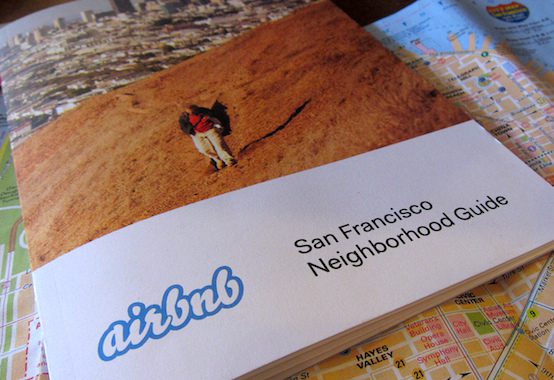Can Technology Build a Village?

We live in a rapidly urbanizing world. But Brian Chesky, co-founder and CEO of Airbnb, thinks we are also seeing an type of urbanism resurface, one in which trust—and the village—take center stage.
Airbnb’s business model is dependent on principles of trust and friendliness: it enables people to rent out their homes to travellers, thus replacing the more customary and mainstream hotel. At the Aspen Ideas Festival, says Atlantic editor Uri Friedman, Chesky told attendees the Internet is actually moving things back to a local level by enabling people to become “micro-entrepreneurs.” This local economic empowerment then has a seismic impact on urban business and cultural development as whole:
“At the most macro level, I think we’re going to go back to the village, and cities will become communities again,” he added. “I’m not saying they’re not communities now, but I think that we’ll have this real sensibility and everything will be small. You’re not going to have big chain restaurants. We’re starting to see farmers’ markets, and small restaurants, and food trucks. But pretty soon, restaurants will be in people’s living rooms.”
Not everyone may be comfortable with a model this decentralized—but it is true that online tools like Twitter, Facebook, and mobile apps have changed the way businesses work. Food trucks can tweet their locations to followers, thus building a faithful community as they travel. Hole-in-the-wall restaurants can be found easily via Google maps and Facebook pages. The app I reviewed on Thursday, Huckle & Goose, is another example of the way technology is helping people connect with local entrepreneurs—in this case, local farmers. Companies like Airbnb and Uber take things to another level: they require us to place our faith in the host company and its system of accountability, as well as the entrepreneur whose services we claim.
David Brooks affirmed this in his column on Airbnb, called “The Evolution of Trust“—he writes that, in today’s world, people “are both hungrier for human contact and more tolerant of easy-come-easy-go fluid relationships.” In this world, apps like Airbnb are perfect catalysts for a “a new trust calculus,” a new status quo in which “flexible ad-hoc arrangements” and peer-to-peer commerce are the norms.
But the village mentality that Brooks and Chesky are observing doesn’t necessitate actual geographic villages. To the contrary: the places these apps and websites are most likely to be used are urban or international places. They help convey the feel of a village, in the rush and clamor of the big city. But perhaps this is where such services are most needed: real villages are geographically, necessarily, connected and close. The city is where we most often feel lost and isolated.
Friedman notes that the rapid urbanization of our world seems to go against the trend Chesky is identifying:
“Chesky sees village-like networks sprouting in cities at a time when urbanization is also going in the polar opposite direction. More than half of the world currently lives in cities, and the United Nations predicts that two-thirds of the global population will be urban-dwellers by 2050. In 2011, there were 23 “megacities” of at least 10 million people around the world. By 2050, there will be 37. It’s possible that as cities balloon to overwhelming sizes, we’re coping by carving out smaller communities. But it’s also possible that the phenomenon Chesky is describing is primarily playing out in Western countries. After all, Asia, where Airbnb has a relatively small presence, will account for most new megacities in the coming decades.”
I think Friedman’s first reason is spot-on, though only time will tell if he’s correct: in the midst of rapid globalization, people seem to be struggling to find a niche, a community. They don’t just want to visit the same chain stores, the same thoroughfares. They don’t want to constantly feel like another face in the crowd. Instead, they’re looking for ways to build community, even as their world becomes more isolated and atomized. Companies like Airbnb seem to provide that.
Some have accused technology of speeding up globalization—of creating a world in which we feel lonely and separated from the little platoons around us. But could it be that, with time, technology will fix the woes it created? Human nature will always yearn for community—Aristotle called us “social animals.” If he was right, then our desire for real closeness with other humans won’t simply go away. Either we’ll abandon the tools that isolate us, or we’ll adapt them to suit our community-craving needs. If Chesky is right, the latter may create the urban community of the future.
Comments